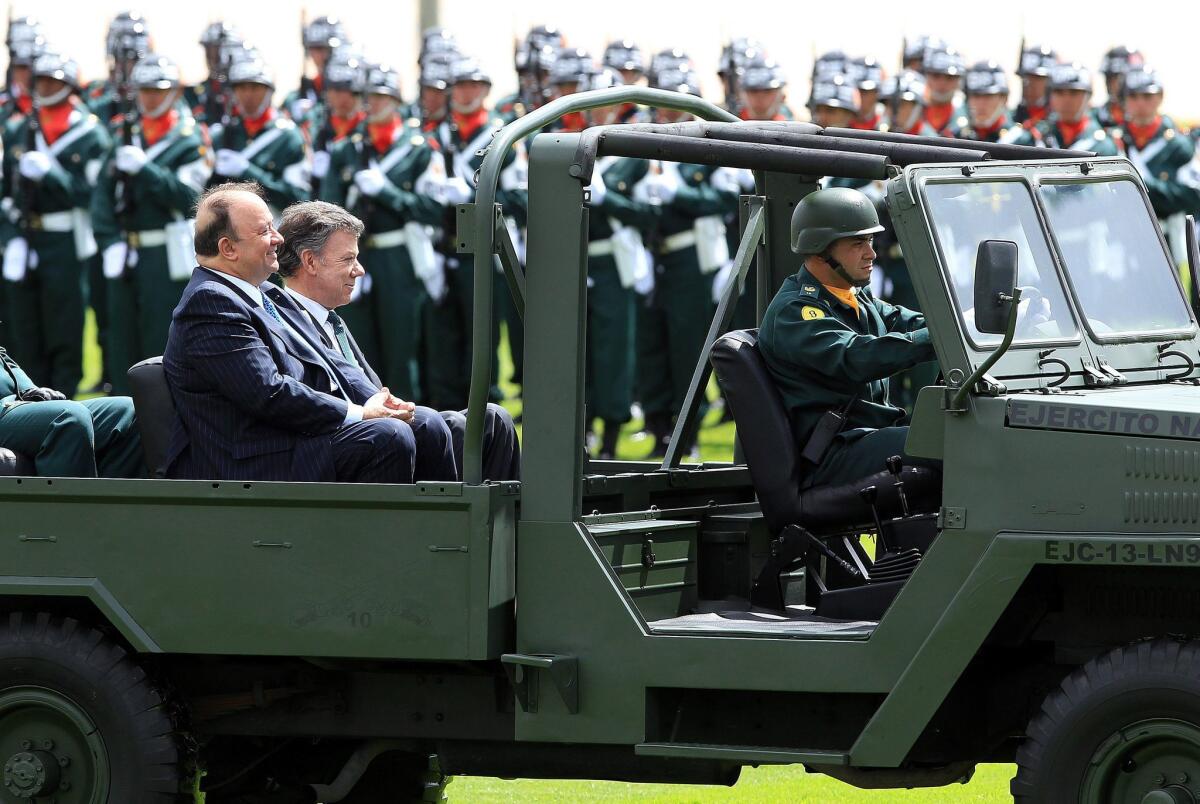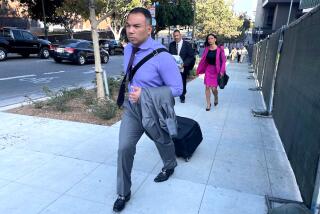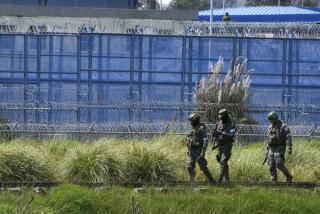Colombian army’s top leadership not facing justice in killings, report says

Colombian President Juan Manuel Santos, right, and new Defense Minister Luis Carlos Villegas review army troops during a military ceremony in Bogota. A new report indicates that top Colombian army brass “knew or should have known” about the extrajudicial killings of hundreds of civilians labeled as rebels.
Twenty-five-year-old street vendor Mauricio Duarte Guzman went out to play billiards one night in his rural Colombian home town of Gigante and never came home. His mother found him dead the next day in an army morgue, tagged by the local brigade as a rebel killed in combat.
Guzman’s mother, Hilda Guzman, said her son was one of several people from her town in southern Huila province who disappeared in 2007 during a wave of so-called “false positive” slayings. The cases involved unemployed, handicapped and otherwise disadvantaged youths across the country who were allegedly kidnapped and killed by military units and then identified as leftist guerrillas to inflate body counts.
“He was a good, healthy boy who had nothing to do with the rebels, and he was despicably murdered,” Hilda Guzman said in an interview. “Eight years later, I haven’t forgotten him, and I am still waiting for justice. The government has yet to pay me reparations.”
Cases such as Guzman’s are not rare, activists say. A report issued Wednesday by Human Rights Watch accused the Colombian military of “widespread and systematic extrajudicial killings” of hundreds of civilians between 2002 and 2008, when the armed forces’ progress in the nation’s decades-long war was measured largely by the number of rebels killed in action.
While Colombia’s false positive atrocities have been known about for years, the HRW report said it has obtained previously unpublished prosecutorial evidence indicating that top Colombian army brass “knew or should have known” about the extrajudicial killings and that they should face criminal charges. Among those implicated is armed forces commander army Gen. Juan Pablo Rodriguez Barragan, the report said.
“False positive killings amount to one of the worst mass atrocities in the Western Hemisphere in recent years, and there is mounting evidence that many senior army officers bear responsibility,” said Jose Miguel Vivanco, HRW’s Americas executive director. “Yet the army officials in charge at the time of the killings have escaped justice and even ascended to the top of the military command.”
Army representatives have denied special treatment for top-level officers, saying that 900 cases have been brought before various courts. The Colombian attorney general’s office is known to have investigated at least 3,700 cases of extrajudicial killings.
El Tiempo newspaper of Bogota reported Wednesday that four generals, including former army commander Gen. Mario Montoya, have been called to testify by a special prosecutor appointed by the Supreme Court in connection with reported false positives.
Citing “overwhelming caseloads,” the HRW report criticized the slow pace of justice, saying that so far, “mostly lower ranking soldiers have been convicted.” Vivanco called on the Colombian government to add prosecutors to pursue charges more aggressively against unit commanders, claiming that only a “handful of colonels and no generals” have been convicted.
Ramiro Orjuela, a Bogota-based human rights attorney who helped research the HRW report, said the slow pace of prosecutions of army leadership is because of a “lack of political will. ... This is a very precise demonstration of how the attorney general’s office remains fearful of the army leadership, who are extremely powerful. Potential witnesses in these cases have been threatened and even killed.”
HRW also called on the U.S. government to review its military and anti-terrorism aid program that under Plan Colombia has totaled more than $9 billion since 2000. U.S. officials should enforce the Leahy Law passed by Congress in 1996, which calls on the government to withhold military aid to units suspected of human rights crimes, HRW’s report said.
The report confirms past studies, including a groundbreaking 2008 report by the International Observation Mission on Extrajudicial Executions and Impunity in Colombia, a joint effort by 13 international human rights experts that helped bring the false positive atrocities to light.
“This (HRW) report confirms what we all knew: that responsibility for the extrajudicial execution scandal in Colombia reaches top leadership,” said Lisa Haugaard of the Washington-based Latin America Working Group think tank. To help complete the 2008 study, Haugaard said she interviewed witnesses and family members linked to 130 deaths.
“What we heard was shockingly similar: groups of soldiers detaining poor young men taken in civilian clothes, who were later found dead in army morgues dressed in guerrilla uniforms,” Haugaard said.
A preliminary version of the 2008 report was released prior to a mass killing that broke the false positives scandal wide open. That case involved 26 young men from a poor Bogota suburb who were promised work in North Santander province, but who instead were slain and claimed as rebel fighters killed in action.
Last year, an extensive report by the New York–based peace advocacy group Fellowship of Reconciliation, or FOR, also linked false positive killings to specific Colombian army units and commanders who had received training at the U.S. Army’s Ft. Benning and other installations.
John Lindsay-Poland, a former FOR official who managed the study and is now with the American Friends Service Committee, said the FOR and HRW studies are especially relevant because the U.S. government is using Colombian officers to train foreign militaries in Central America and the Middle East.
“The findings of FOR and HRW show that Colombian military leadership is not a model that should be exported, and the U.S. training of these officers should be evaluated for its impact on human rights abuses,” Lindsay-Poland said.
The accusations against Colombian military brass are also relevant, Lindsay-Poland said, because of the peace negotiations underway in Havana between the Colombian government and Revolutionary Armed Forces of Colombia, or FARC, rebels that aim to end the long-running conflict.
The peace talks are stuck on “transitional justice” issues, including whether rebel or military commanders will face trials and possible prison time for crimes against humanity. Both Vivanco and Lindsay-Poland warn that terms of any peace deal should not include impunity for army officials convicted of criminal involvement in false positives.
Kraul is a special correspondent.
More to Read
Start your day right
Sign up for Essential California for news, features and recommendations from the L.A. Times and beyond in your inbox six days a week.
You may occasionally receive promotional content from the Los Angeles Times.






